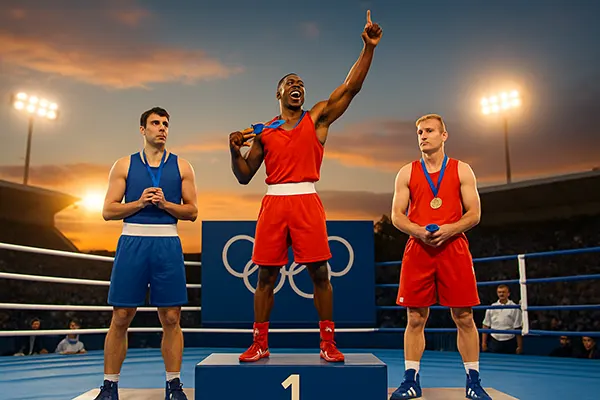The Olympic boxing arena, once a proving ground for legendary fighters and a proud component of the Games, now stands at a crossroads. Administrative scandals, judging controversies, and threats of exclusion from the Olympics have cast a shadow over the sport. As the world looks towards Los Angeles 2028, hopes are pinned on a renaissance that could redefine boxing’s future in the Olympic movement.
Decline and Turmoil in Olympic Boxing
Boxing’s Olympic journey has been marred by systemic issues for decades. From allegations of corrupt officiating in Seoul 1988 to the highly controversial decisions in Rio 2016, the integrity of Olympic boxing has frequently come under scrutiny. This persistent pattern has led to an erosion of trust among fans, athletes, and national federations alike.
The crisis peaked when the International Olympic Committee (IOC) suspended the International Boxing Association (IBA) in 2019 due to governance failures and financial mismanagement. In its place, the IOC took control of boxing at Tokyo 2020, an unprecedented move that underscored the depth of the crisis. The IBA’s later refusal to reform only deepened concerns.
In 2023, despite some organisational changes, the IOC voted to withdraw recognition of the IBA permanently. The result: Olympic boxing found itself without a governing body officially recognised by the IOC, putting the sport’s future on the Olympic programme in jeopardy.
Loss of Trust and Calls for Reform
The heart of the crisis lies in the credibility gap. Athletes have repeatedly voiced frustrations over unclear judging criteria and decisions that seem arbitrary at best. Several boxing nations have called for transparent scoring systems, independent oversight, and stronger athlete representation in decision-making processes.
Initiatives such as the establishment of new federations, like World Boxing, are steps towards restoring credibility. Backed by key nations such as the USA and UK, World Boxing aims to build an accountable and transparent body that aligns with Olympic values. Yet, the road to legitimacy is complex, requiring IOC recognition and universal adoption.
Moreover, the disconnection between fans and Olympic boxing has widened. Without star power, consistent narratives, or clear promotion, the sport has struggled to compete with the popularity of professional boxing or emerging disciplines like MMA. To win back the audience, reforms must also address the spectacle and accessibility of the sport.
Los Angeles 2028: A Turning Point?
With the Los Angeles Games on the horizon, 2028 presents a critical juncture. The United States, a historically significant nation in Olympic boxing, could play a pivotal role in revitalising the sport. Its robust amateur system, storied Olympic history, and media power can help repackage Olympic boxing for a global audience.
IOC President Thomas Bach has affirmed that boxing is included in the LA28 programme—albeit under strict conditions. These include guarantees of fair judging, financial transparency, and clear governance structures. This conditional inclusion reflects both a warning and an opportunity for the sport to prove its reformative intent.
Hosting boxing in a city with deep ties to combat sports could attract new investment, drive audience interest, and inspire a new generation of Olympians. But this depends entirely on the sport’s ability to present a unified, ethical, and forward-looking framework that satisfies the IOC’s expectations and fans’ demands.
The Role of the United States
As host nation, the USA has a unique opportunity to shape the future of Olympic boxing. The country’s boxing federation has been among the first to align with the new World Boxing entity, distancing itself from the IBA. This move signals a commitment to reform and positions the US as a potential leader in boxing’s Olympic rebirth.
Furthermore, American athletes remain among the top talents globally, and their performance on home soil could reinvigorate interest. With proper support, infrastructure, and transparent pathways from amateur to Olympic levels, the USA could offer a model for sustainable development.
Collaboration with other democratic and sport-reform-focused nations will be essential. If the LA Games are to serve as the lifeline for Olympic boxing, coordination across multiple stakeholders—athletes, coaches, officials, and media—will be key to rebuilding a credible and exciting competition.

The Future Beyond 2028
Even if boxing successfully features in LA28, its long-term Olympic survival is far from guaranteed. Sustainability depends on creating a coherent international federation that is not only recognised by the IOC but respected by athletes and fans worldwide.
Efforts must go beyond surface-level reform. Athlete welfare, inclusive development programmes, and anti-doping measures must be part of a wider agenda. Boxing cannot afford to return to the past once it regains its place in the Olympic spotlight.
Equally important is global representation. Ensuring that nations from all continents can compete fairly and have access to high-quality training and competition will reinforce the sport’s integrity and appeal. Equity and opportunity should be the cornerstones of boxing’s new Olympic era.
Time for Strategic Vision
Olympic boxing stands at a critical threshold. With danger comes the chance for transformation. A sport long criticised for its opaque practices now has the momentum to reshape its governance and presentation for a modern audience.
Stakeholders must embrace a long-term strategy: one that includes digital engagement, youth development, gender parity, and cultural relevance. Only through such strategic thinking can boxing thrive beyond 2028 and reclaim its rightful place in the Olympic pantheon.
Ultimately, the question is no longer whether boxing can survive—but whether it can evolve. Los Angeles 2028 could be the beginning of a renewed chapter, but only if the sport dares to break with its troubled past and build a future rooted in integrity and vision.
